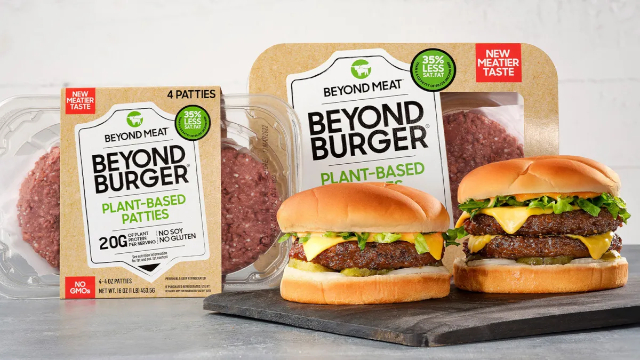The common impression is that plant-based meat substitutes are being heartily embraced by consumers. But a new survey in the U.S. reveals that reports of major-percentage increases in sales don’t tell the whole tale. In fact, sales of plant-based ‘meats’ are declining…
 Beyond Foods was the first player to get its meat substitutes on the market, Now its in
Beyond Foods was the first player to get its meat substitutes on the market, Now its in
a tight race with competitor Impossible foods for partnerships with
the big Fast Food chains and supermarket sales.
Last Sunday I posted a story headed: ‘Plant-Based Foods’ Popularity Surges’, in which I summarized the results of another survey, saying, “Brits doubled their plant-based foods consumption between 2008 and 2011, and again between 2017 and 2019. That’s a remarkable surge in the popularity of plants by anyone’s measure.” It seems the final statement, there, was not wrong. But anyone who works with numbers knows that, contrary to the old maxim, numbers do lie. And statistics are often made to lie, to support the issuer’s story.
How do statistics lie?
Lots of ways. For example, varying the vertical and horizontal scales of graph can make a small increase or decrease look huge. But the champions in the statistical deception game are percentages.
For example: Let’s say the statistics show that, in a given month, the annual rate of unemployment is up 4 percent from what it was a year ago. That doesn’t seem like much. But in a country like the U.S., where the population is currently just over 333 million, that translates to a real figure of more than 13 million more people without jobs than in the same month the year before. Sounds more serious, doesn’t it?
About UK plant-based food popularity…
So. It sounds amazing that the number of Brits who had tried plant-based foods doubled, and redoubled, all in a 10-year period. But let’s look at some factors that might have warped the statistics.
First: The folks who performed the UK study went in looking for an increase in the popularity of plant-based foods. Never assume that any process in which humans are involved is entirely objective. It only follows that the researchers would frame their findings to suit their expectations.
Second: The study avoided reporting the overall increase in the sales of plant-based foods over the study period. What the study did report was how many residents in the survey pool has tried plant-based food substitutes. That doesn’t mean they regularly buy and consume them.
Third: The percentages quoted in the study abstract were relatively small – when compared to the numbers of UK residents embracing plant-based food alternatives it would take to meet the official environmental goals for reduction greenhouse gas emission goals.
But now, a new U.S> study tells a much less optimistic tale.
About the new U.S. study…
First: A new U.S. Study deals in hard sales figures for the major plant-based meat substitute makers – not potentially deceptive percentages. Based on those numbers, “We’ve seen a big deceleration,” says Chris DuBois, senior vice president of the protein practice division of IRI Global consumer surveys.
Second: Plant-based meat substitutes, which are still somewhat more costly than real meat products, were apparently shunned by many cash-strapped consumers during the worst of the COVID-19 pandemic, causing a notable drop in sales.
Michael H. McCain, president and CEO of Maple Leaf Foods says: “[O]ur performance has suffered in the middle of [the COVID pandemic], but the more concerning set of facts are rooted in category performance, which [has] basically flatlined.” Hence, the next point…
Third: While the UK study didn’t look at the overall popularity of Plant-based substitutes, the U.S. study spotlights the fact that they only make up only a very small slice of the total meat market. “Plant-based meats don’t make up 50% of the market or 25%. Despite all of the noise, it’s 1.5% of meat sales. It’s still relatively small,” Dubois points out.
We might speculate that lots of people have been trying plant-based substitutes – like daring to taste a plant burger (see photo, top of page) once at their fave Fast Food outlet – but they’re not buying them regularly, much less changing their eating habits substantially. Regardless, 1.5 percent of the overall market definitely not going to make the kind of dent in greenhouse gasses the environmentalists are demanding.
The corporate reality
The facts are stark for industry players who have invested billions in the development and marketing of plant-based foods.
Greenleaf Foods’ sales fell to C$48 million ($38.5 million (US)) from C$51.4 million ($41.3 million (US)) during the same period of the year before. Greenleaf, which is owned by Maple Leaf, markets its products under the Field Roast and Lightlife brands.
Beyond Meat, which issued third quarter financial guidance predicting $120 million in sales to $140 million in sales reported only $106 million in revenues during the period.
The harsh reality
“If they simplify the ingredient list [i.e. – lower production costs and, by association, retail prices] it may be one or two percentage points higher,” Dubois says. “Meat alternatives are going to be niche products for a long time.”
My take
The UK study couches the facts about consumer uptake of plant-based foods in potentially deceptive statistics and hazy definitions of what a plant-based food is. The U.S. study tells the story in all its gory glory. Clearly, the general public is not poised to massively increase their consumption of plant-based food alternatives, and give up conventional meat.
Muse on that…
~ Maggie J.

